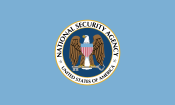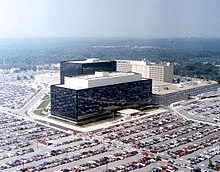Armed Forces Security Agency

Seal of the National Security Agency
|
|

Flag of the National Security Agency
|
|
 NSA Headquarters, Fort Meade, Maryland |
|
| Agency overview | |
|---|---|
| Formed | November 4, 1952 |
| Preceding agency |
|
| Headquarters |
Fort Meade, Maryland, U.S. 39°6′32″N 76°46′17″W / 39.10889°N 76.77139°WCoordinates: 39°6′32″N 76°46′17″W / 39.10889°N 76.77139°W |
| Motto | "Defending Our Nation. Securing The Future." |
| Employees | Classified (30,000–40,000 estimate) |
| Annual budget | Classified (estimated $10.8 billion, 2013) |
| Agency executives | |
| Parent agency | United States Department of Defense |
| Website | www.nsa.gov |
The National Security Agency (NSA) is an intelligence organization of the United States federal government responsible for global monitoring, collection, and processing of information and data for foreign intelligence and counterintelligence purposes, a discipline known as signals intelligence (SIGINT). NSA is concurrently charged with protection of U.S. government communications and information systems against penetration and network warfare. Although many of NSA's programs rely on "passive" electronic collection, the agency is authorized to accomplish its mission through active clandestine means, among which are physically bugging electronic systems and allegedly engaging in sabotage through subversive software. Moreover, NSA maintains physical presence in a large number of countries across the globe, where its Special Collection Service (SCS) inserts eavesdropping devices in difficult-to-reach places. SCS collection tactics allegedly encompass "close surveillance, burglary, wiretapping, breaking and entering".
Unlike the Defense Intelligence Agency (DIA) and the Central Intelligence Agency (CIA), both of which specialize primarily in foreign human espionage, NSA does not unilaterally conduct human-source intelligence gathering, despite often being portrayed so in popular culture. Instead, NSA is entrusted with assistance to and coordination of SIGINT elements at other government organizations, which are prevented by law from engaging in such activities without the approval of the NSA via the Defense Secretary. As part of these streamlining responsibilities, the agency has a co-located organization called the Central Security Service (CSS), which was created to facilitate cooperation between NSA and other U.S. military cryptanalysis components. Additionally, the NSA Director simultaneously serves as the Commander of the United States Cyber Command and as Chief of the Central Security Service.
...
Wikipedia
